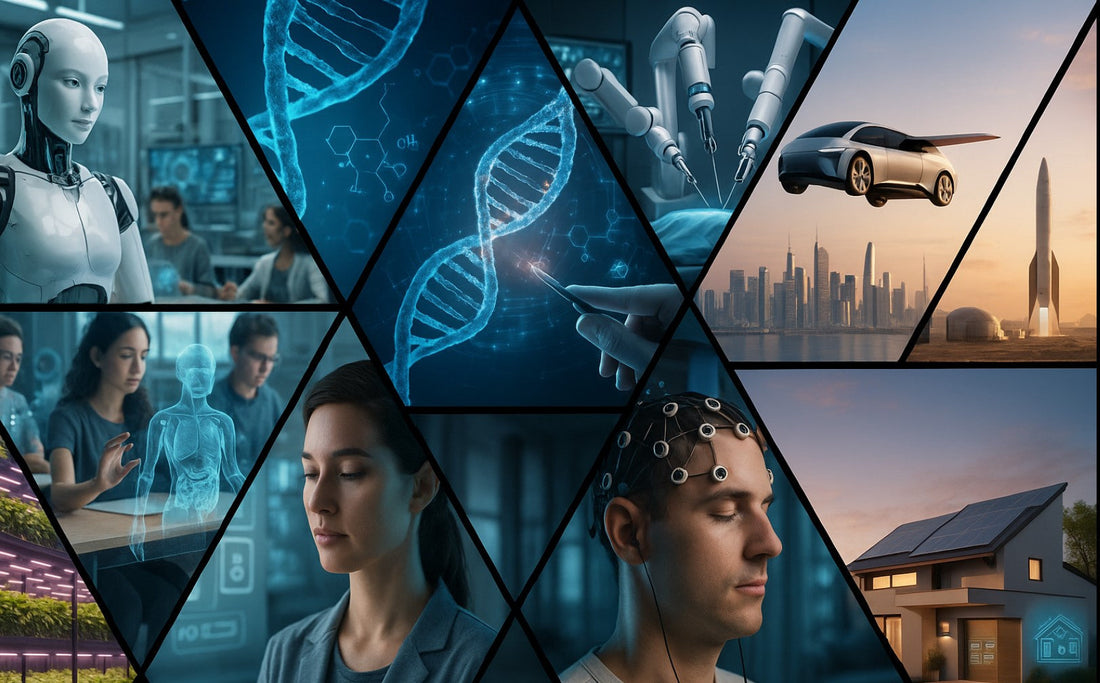
Top 10 Future Inventions That Could Change the World
Elsayed ZewayedShare
Top 10 Future Inventions That Could Change the World

Introduction
Since the dawn of human civilization, inventions have shaped the way societies live, work, and communicate. The wheel, electricity, and the internet are just a few breakthroughs that redefined entire eras. But as technology continues to accelerate, the future holds even greater promises. From advanced artificial intelligence to space colonization, the coming decades could deliver inventions that will radically change our world. Below, we explore ten of the most impactful innovations that experts believe are on the horizon.
1. Artificial General Intelligence (AGI)
Today’s artificial intelligence is powerful but narrow, designed for specific tasks like image recognition or customer service. The next frontier is Artificial General Intelligence (AGI) — machines capable of reasoning, learning, and problem-solving across a wide range of domains just like humans. AGI could revolutionize industries such as medicine, education, and logistics, but it will also raise ethical and regulatory challenges.
2. Genetic Medicine and DNA Editing
The rise of CRISPR gene-editing technology has already shown glimpses of the future of healthcare. Soon, genetic medicine could correct hereditary disorders like sickle cell anemia or muscular dystrophy. Personalized treatments based on a patient’s DNA will improve survival rates, reduce side effects, and extend life expectancy, ushering in a new era of “precision healthcare.”
3. Robotic Surgery and Medical Automation
Robotics in healthcare is not new, but the future holds much more sophisticated systems. AI-powered surgical robots will be able to conduct minimally invasive procedures with unmatched accuracy, reducing recovery times and lowering the risks of complications. Hospitals of the future may rely heavily on automated systems to handle both complex surgeries and routine diagnostics.
4. Augmented Reality and Interactive Holograms
The way humans learn and interact will shift with augmented reality (AR) and holographic projections. Education could become a fully immersive experience, where students “walk through” historical events or anatomy classes. Architects and engineers could design and manipulate 3D models in real time. Even shopping may involve holographic “try-before-you-buy” experiences.
5. Fusion Power: The Energy of the Future
If scientists succeed in making nuclear fusion commercially viable, humanity will gain access to a nearly limitless source of clean energy. Unlike fossil fuels, fusion creates no greenhouse gases, and unlike fission, it produces minimal long-lived radioactive waste. Fusion could eliminate energy scarcity, reduce climate change pressures, and reshape the global economy.
6. Flying Cars and Autonomous Vehicles
Transportation is on the verge of a revolution. Flying cars and self-driving taxis are already being tested in major cities. Within a few decades, we may see air corridors for passenger drones, reducing traffic congestion and commuting times. Combined with electric propulsion, these vehicles could make travel faster, safer, and more sustainable.
7. Vertical Farming and Smart Agriculture
With urban populations growing, the need for sustainable food production will increase. Vertical farms — skyscraper-like greenhouses using LED lighting and automated irrigation — can produce large quantities of food in small spaces. This reduces dependency on rural land, lowers transportation costs, and ensures year-round crop availability even in challenging climates.
8. Brain-Computer Interfaces (BCI)
Brain-computer interfaces will allow direct communication between the human brain and electronic devices. This could restore mobility for paralyzed individuals, enhance memory and learning, or even allow people to communicate silently through thought. While this raises privacy and ethical concerns, it may also open the door to a new level of human potential.
9. Smart and Self-Sufficient Homes
Future homes will not just be “smart” in the sense of voice-activated assistants. They will be self-sustaining ecosystems, generating their own energy through solar panels, recycling water, and regulating indoor temperatures automatically. Built from advanced materials, these houses will drastically reduce energy costs and environmental impact while improving comfort and safety.
10. Space Exploration and Colonization
The dream of living beyond Earth is no longer science fiction. Companies like SpaceX and government agencies such as NASA are developing technologies for colonizing the Moon and Mars. Establishing human settlements in space would not only expand humanity’s horizons but also provide solutions for overpopulation and resource scarcity on Earth.
The inventions of the future promise to reshape human existence in ways that are difficult to fully grasp today. From the microscopic level of DNA to the cosmic scale of interplanetary travel, these breakthroughs carry both incredible opportunities and profound responsibilities. As society stands on the edge of this technological frontier, the challenge will be ensuring that innovation serves humanity’s best interests.
